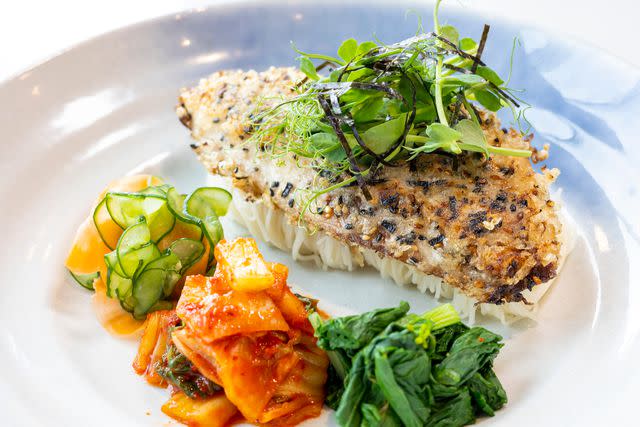How to Respect Hawai’i’s Resources While Visiting, According to a Local
Joe Ibarra is one of many Hawaiians within the tourism industry working to protect the island's ecosystem, encouraging visitors to give back what they take.

Kjell Linder / Getty Images
How to Help Hawai'i
Our hearts go out to everyone affected by wildfires in Maui. Please follow Maui Rapid Response and Maui Food Bank to see how you can help.
“Tourism is consumption.”
It takes a lot for me to slow down during meals, especially when there’s a Japanese-style breakfast of just-whipped natto, bouncy tamagoyaki, and steamed rice in front of me. But this statement from Joe Ibarra, the general manager of Honolulu’s Kahala Hotel & Resort, made me pause. I put my chopsticks down.
During his upbringing and career, Ibarra, who is a native Hawaiian, has witnessed how tourism can gradually strip a destination, especially one as popular as his home, of its culture and natural resources. And though “sustainable travel” is a buzzword these days, Hawaiians have prioritized protecting their fragile and highly intertwined ecosystem for centuries.
“This idea is based on the Ahupuaʻa system, a land division system that says everything from the mountain (kula) to the ocean (makai) is connected and has a reciprocal relationship,” Ibarra explained. “Because our resources are finite, we need to have a balance, and give back whatever we take.”
Launched in 2018, Kahala’s KISCA (Kahala’s Initiative for Sustainability, Culture & the Arts) program makes it easy to be a steward of the environment while on vacation. Case in point? The Maui Nui Venison Burger. On the menu at the all-day restaurant Plumeria Beach House, this deeply savory riff on the classic comfort food layers sweet and smoky bacon-pineapple chutney, nutty cheese from Waialua, and Kawamata Farms tomatoes atop an axis deer meat patty. It’s leaner and more nutrient-dense than ground beef, not gamey, and comes from an invasive species with no natural predators that’s humanely harvested. Even better? A portion of the sales benefits KISCA’s three nonprofit partners dedicated to the preservation of Hawai'i: Mālama Maunalua, Koʻolau Mountains Watershed Partnership, and Maunalua Fishpond Heritage Center.

Courtesy of Kahala Hotel & Resort
Thanks to the considered sourcing of Kahala’s executive chef Jonathan Mizukami, there are plenty of other dishes honoring Hawai'i’s vibrant and diverse bounty, like the hand-cut angel hair pasta at Kahala's fine-dining spot Hoku’s. Though my nose can easily recall the pleasingly pungent perfume of fresh Alba white truffle, which is generously shaved over the plate tableside, it’s the story behind the moringa from Mountain View Farms that still lingers in my head.
On top of lending the delicate noodles a striking pea-green hue, the powerhouse plant — which farm owner David Wong credits his current good health to after a cancer diagnosis in 2014 — is grown “without the use of any fertilizers, pesticides, and herbicides” and based on the organic principles of Korean Natural Farming (KNF). His farm also uses 40% less water than conventional ones to alleviate the growing strain on Hawaii's water resources.
Related: The Real Flavor of Maui Is Found at the Farmers Market
Other simple ways Kahala helps you respect the islands include opting into the $10 KISCA donation upon check-in (Ibarra says 75% of resort guests participate), attending a beachside Sunset Seminar to learn more about safeguarding Hawai'i’s environment and culture, and draping your lei on the poolside tree before you depart. This may seem like an insignificant gesture, but returning your welcome gift to the land where it came from shows gratitude and respect for nature’s life cycles.
Even flying to Hawai'i can be done more mindfully with Hawaiian Airlines. After unveiling its Travel Pono program in September 2021 with an in-flight video featuring crew and their expert tips on how to responsibly explore their home, the state’s largest and longest-running airline expanded its commitment to caring for the planet with partnerships with Conservation International — passengers can offset their carbon footprint by contributing to forest preservation projects — and Mananalu, the eco-friendly and plastic negative water company started by actor and activist Jason Mamoa.

Courtesy of Hawaiian Airlines
Volunteer opportunities are also available at most of the nonprofits Hawaiian Airline teams up with, like Kākoʻo ʻŌiwi, a community-based nonprofit that’s helping sustainably restore 405 acres for the agricultural production of kalo (taro).
In the end, the goal is simple: to protect Hawai'i’s culture and natural resources now, so future generations of native Hawaiians and visitors can enjoy them, too. As Ibarra puts it, “I want people in 50 and 60 years to see and experience everything we have today.”
This story was originally published January 11, 2023.
For more Food & Wine news, make sure to sign up for our newsletter!
Read the original article on Food & Wine.

